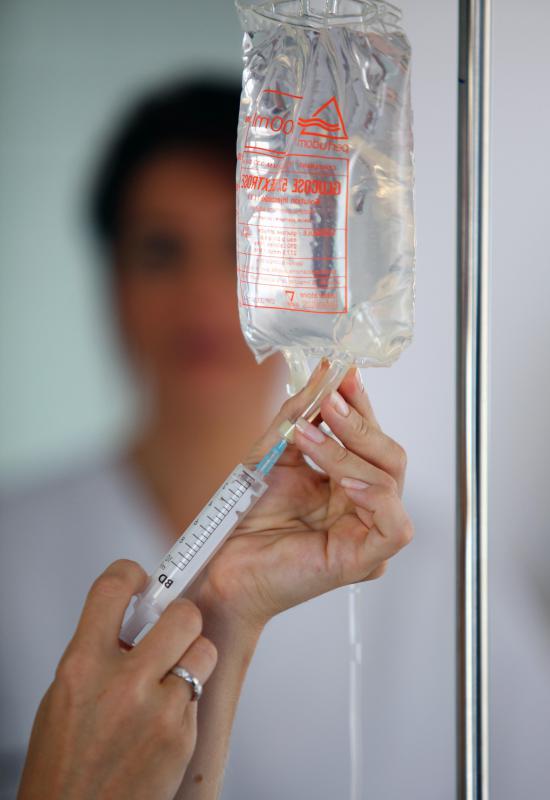At TheHealthBoard, we're committed to delivering accurate, trustworthy information. Our expert-authored content is rigorously fact-checked and sourced from credible authorities. Discover how we uphold the highest standards in providing you with reliable knowledge.
What is a PCA Pump?
A patient-controlled analgesia (PCA) pump is a pain management device used in hospitals and occasionally in the home. This pain pump is separate from an IV pump, although the intravenous line that comes from the PCA pump is usually attached to the main IV line. This allows for the administration of IV painkillers directly into a patient's vein for quick and effective pain relief.
A patient-controlled analgesia pump can be set to deliver a continuous infusion of pain medicine, or it can be set to deliver pain medicine only when the patient pushes a button. In cases where there is a need for high doses of narcotics to alleviate pain, the device can be programmed to deliver a continuous infusion; the patient may also be able to push a button when needed for extra doses of pain medicine. The most common pain medications used in these pumps are morphine, Demerol®, or Dilaudid®.

A PCA pump is often used for pain control in postsurgical care. It may also be used for people with chronic health conditions such as cancer. The doctor determines the amount of pain medication the patient is to have. This pump has a timing device that can be programmed to prevent the patient giving himself too much pain medication. If the lockout time is set for ten minutes, for example, the patient will receive only one dose of pain medication every ten minutes no matter how many times he pushes the PCA button.

The PCA pump is considered safe to use because only a nurse or other medical professional can change the settings on the pump with a special key. The pumps have safeguards in place that will alert a nurse if a setting is not correct or if something is wrong with the pump. The settings on the PCA pump should always be checked by two qualified health care professionals before it is connected to the patient. A PCA pump is so simple and safe to use that it is often recommended for children when pain control is needed.
The biggest advantage to using a PCA pump for pain control is the consistent level of pain medication that stays in the body. Keeping an adequate level of pain medication in the body can help the patient avoid severe painful flare ups when the pain medication wears off. It also helps the patient be more relaxed, knowing he can medicate himself for pain instead of waiting on a nurse to administer the medicine. Using a patient-controlled analgesia device can help most patients recover quicker.
AS FEATURED ON:
AS FEATURED ON:












Discussion Comments
If there is no liquid medicine to be injected, like a continuous flow of morphine, there is no reason for the pump.
Studies like the one done in Pennsylvania by a combination of sources including the FDA, say that about 1 in 10 pumps will malfunction, resulting in almost 4,200 reported cases with injury or death in about 20 percent of the 4,200, plus reported cases.
Most deaths and injures occur when a failure of the pda pump allows too much morphine to be administered at one time.
These reports were put out by the government's own studies. These pumps can also be very good and effective for a variety of health conditions like my mom's chronic stage 4 COPD, but beware. These incidents are under reported and often the death is blamed on the patient's disease, since many are in hospices or nursing homes and that avoids lawsuits. -- Bob E.
Do the PCA always go with an IV fluid? If the physician discontinued the fluid should the PCA pump also be discontinued?
Post your comments